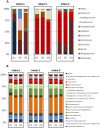The establishment of the infant intestinal microbiome is not affected by rotavirus vaccination
- PMID: 25491920
- PMCID: PMC4261165
- DOI: 10.1038/srep07417
The establishment of the infant intestinal microbiome is not affected by rotavirus vaccination
Abstract
The microbial colonization of the intestine during the first months of life constitutes the most important process for the microbiota-induced host-homeostasis. Alterations in this process may entail a high-risk for disease in later life. However, the potential factors affecting this process in the infant are not well known. Moreover, the potential impact of orally administered vaccines upon the establishing microbiome remains unknown. Here we assessed the intestinal microbiome establishment process and evaluated the impact of rotavirus vaccination upon this process. Metagenomic, PCR-DGGE and faecal short chain fatty acids analyses were performed on faecal samples obtained from three infants before and after the administration of each dose of vaccine. We found a high inter-individual variability in the early life gut microbiota at microbial composition level, but a large similarity between the infants' microbiomes at functional level. Rotavirus vaccination did not show any major effects upon the infant gut microbiota. Thus, the individual microbiome establishment and development process seems to occur in a defined manner during the first stages of life and rotavirus vaccination appears to be inconsequential for this process.
Figures




References
-
- Sekirov I., Russell S. L., Antunes L. C. & Finlay B. B. Gut microbiota in health and disease. Physiol. Rev. 90, 859–904 (2010). - PubMed
-
- Wopereis H., Oozeer R., Knipping K., Belzer C. & Knol J. The first thousand days- intestinal microbiology of early life: establishing a symbiosis. Pediatr. Allergy Immunol. 25, 428–438 (2014). - PubMed
-
- Penders J. et al. Factors influencing the composition of the intestinal microbiota in early infancy. Pediatrics 118, 511–521 (2006). - PubMed
-
- Renz H., Brandtzaeg P. & Hornef M. The impact of perinatal immune development on mucosal homeostasis and chronic inflammation. Nat. Rev. Imunol. 12, 9–23 (2012). - PubMed
Publication types
MeSH terms
Substances
LinkOut - more resources
Full Text Sources
Other Literature Sources
Medical

